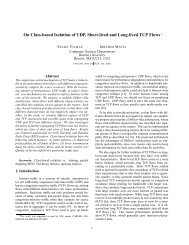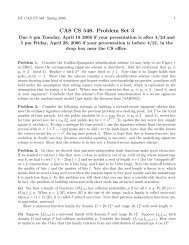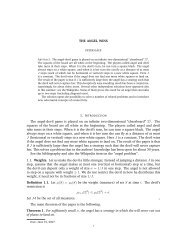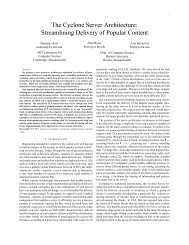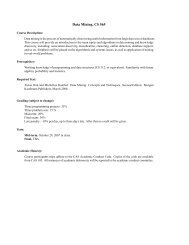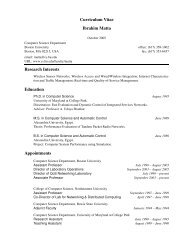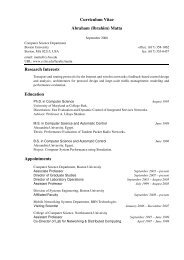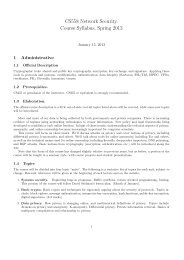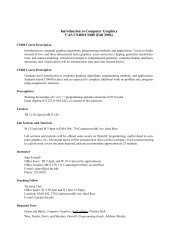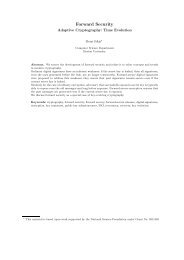uniform test of algorithmic randomness over a general ... - CiteSeerX
uniform test of algorithmic randomness over a general ... - CiteSeerX
uniform test of algorithmic randomness over a general ... - CiteSeerX
Create successful ePaper yourself
Turn your PDF publications into a flip-book with our unique Google optimized e-Paper software.
12 PETER GÁCS<br />
(as in part 1 <strong>of</strong> Example A.3; this process makes sense also for a constructive discrete<br />
space), and setting m(∞) = 1 − ∑ x∈Σ∗ m(x). The extended measure m is not quite lower<br />
semicomputable since the number µ(Σ ∗ {0}) is not necessarily lower semicomputable.<br />
Remark 4.3. A measure µ is computable <strong>over</strong> Σ ∗ if and only if the function x ↦→ µ(x) is<br />
computable for x ∈ Σ ∗ . This property does not imply that the number<br />
1 − µ(∞) = µ(Σ ∗ ) = ∑<br />
x∈Σ ∗ µ(x)<br />
is computable.<br />
Let us allow, for a moment, measures µ that are not probability measures: they may<br />
not even be finite. Metric and computability can be extended to this case (see [22]), the<br />
universal <strong>test</strong> t µ (x) can also be <strong>general</strong>ized. The Coding Theorem and other considerations<br />
suggest the introduction <strong>of</strong> the following notation, for an arbitrary measure µ:<br />
H µ (x) = −d µ (x) = − log t µ (x). (4.1)<br />
Then, with # defined as the counting measure <strong>over</strong> the discrete set Σ ∗ (that is, #(S) = |S|),<br />
we have<br />
H(x) + = H # (x).<br />
This allows viewing H µ (x) as a <strong>general</strong>ization <strong>of</strong> description complexity: we will call this<br />
quantity the <strong>algorithmic</strong> entropy <strong>of</strong> x relative to the measure µ. Generalization to conditional<br />
complexity is done using Remark 3.2. A reformulation <strong>of</strong> the definition <strong>of</strong> <strong>test</strong>s<br />
says that H µ (x) is minimal (within an additive constant) among the upper semicomputable<br />
functions (µ, x) ↦→ f µ (x) with µ x 2 −fµ(x) 1. The following identity is immediate from the<br />
definitions:<br />
H µ (x) = H µ (x | µ). (4.2)<br />
4.1.2. Computable measures and complexity. It is known that for computable µ, the <strong>test</strong><br />
d µ (x) can be expressed in terms <strong>of</strong> the description complexity <strong>of</strong> x (we will prove these<br />
expressions below). Assume that X is the (discrete) space <strong>of</strong> all binary strings. Then we<br />
have<br />
d µ (x) = − log µ(x) − H(x) + O(H(µ)). (4.3)<br />
The meaning <strong>of</strong> this equation is the following. Due to maximality property <strong>of</strong> the semimeasure<br />
m following from the Coding Theorem 4.2 above, the expression − log µ(x) is an upper<br />
bound (within O(H(µ))) <strong>of</strong> the complexity H(x), and non<strong>randomness</strong> <strong>of</strong> x is measured by<br />
the difference between the complexity and this upper bound. See [26] for a first formulation<br />
<strong>of</strong> this <strong>general</strong> upper bound relation. As a simple example, consider the <strong>uniform</strong><br />
distribution µ <strong>over</strong> the set <strong>of</strong> binary sequences <strong>of</strong> length n. Conditioning everything on n,<br />
we obtain<br />
d µ (x | n) + = n − H(x | n),<br />
that is the more the description complexity H(x | n) <strong>of</strong> a binary sequence <strong>of</strong> length n differs<br />
from its upper bound n the less random is x.<br />
Assume that X is the space <strong>of</strong> infinite binary sequences. Then equation (4.3) must be<br />
replaced with<br />
(<br />
d µ (x) = sup − log µ(x n ) − H(x n ) ) + O(H(µ)). (4.4)<br />
n<br />
For the coin-tossing distribution µ, this characterization has first been first proved by<br />
Schnorr, and published in [5].<br />
♦





